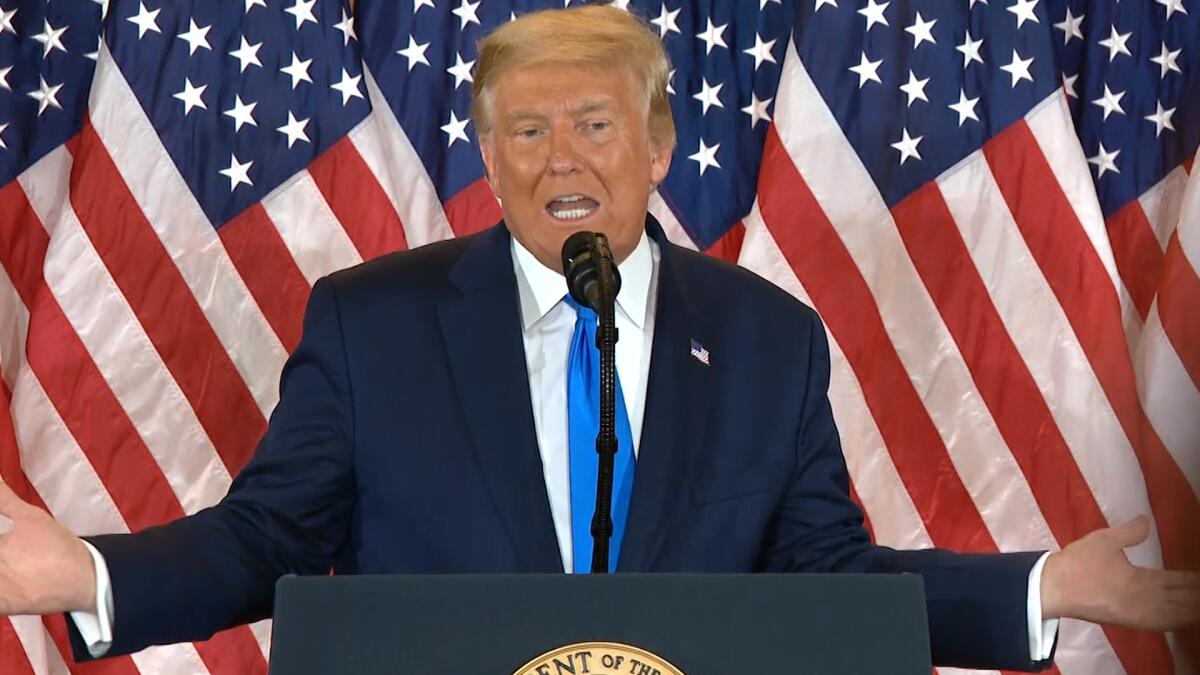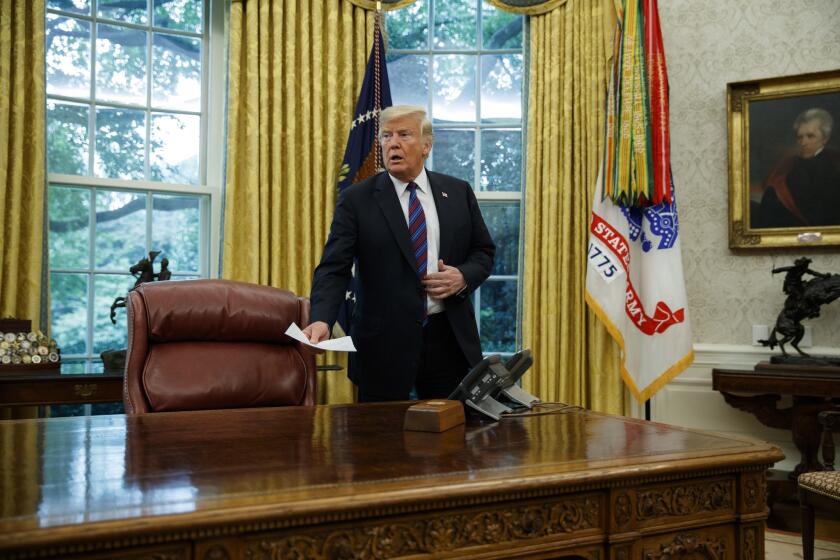Op-Ed: How Trump is laying the groundwork for violence and unrest during Biden’s presidency

- Share via
President Trump’s post-election antics are dangerous. Few expected him to be a graceful loser, but his refusal to officially concede and his flood of tweets insisting the election was rigged may have serious and long-term violent consequences.
Even though he fashions himself as a modern-day strongman, Trump’s tactics mirror those of tin-pot dictators, who simply dismiss election results that don’t work out in their favor — and who portray their political adversaries as illegitimate and resort to intimidation to silence the opposition. It’s the kind of thing we saw in Algeria in the 1990s, Kenya in 2007 and Belarus earlier this year.
In one of the hundreds of tweets Trump has posted since the election in an attempt to undermine the will of the voters, he declared “I WON THE ELECTION, VOTER FRAUD ALL OVER THE COUNTRY.” By trying to convince his supporters that Democrats stole the presidency, Trump is actively delegitimizing the Biden administration and, in the process, condoning all forms of civil disobedience and public unrest related to the election results.
I firmly believe that the president of the United States is laying the groundwork for violence and disruption to unfold regularly over the next four years. As a national security researcher, I never imagined I’d write that sentence.
I’ve studied the causes and outcomes of every insurgency between the end of World War II and 2009. There are 71 of them. Many of the conflicts began when a sizable minority believed its government was in some way illegitimate. Oftentimes the insurgents were correct — governments lost the confidence of the governed due to corruption, human rights abuses or an inability to provide basic services.
Obviously that is not the case in the U.S., where a free and fair election took place. Still, Trump publicly refuses to accept the results. Despite losing, Trump garnered 70 million votes, and many in his fanatic base believe his claim that the election was stolen, inundating social media with the hashtag #StopTheSteal.
By firing Chris Krebs, a well-regarded director of the federal agency that vouched for the reliability of the 2020 election, Trump is showing his supporters that he’s serious about his claims of impropriety — and demonstrating just how desperate he is to hold onto power.
Of course, Trump encouraging his supporters to engage in insurgency-like behavior is nothing new. His incessant rants against the “fake news media” helped motivate Cesar Sayoc, described as a “Donald Trump superfan,” to mail 16 pipe bombs to prominent Democrats and members of the media in 2018. After Trump tweeted “LIBERATE MICHIGAN” in April following the establishment of COVID-19 protocols in that state, legal scholars accused him of inciting insurrection. In Michigan, armed men stormed the state’s Capitol building and anti-government militias plotted to kidnap and potentially kill the state’s governor, Gretchen Whitmer.
Several days after the presidential election, while vote-counting was still taking place in Pennsylvania, police arrested two men on weapons violations near the convention center in Philadelphia. A decal on the back of their vehicle featured QAnon, the conspiracy theory the FBI has labeled a terrorist threat. On Nov. 10, a Staten Island man was arrested for threatening violence against protesters, law enforcement and politicians in response to an election he believed had been “fraudulently stolen from us.”
Facebook and Twitter could ban a civilian Trump from their platforms — but they probably won’t
The result of Trump continuously attacking the pillars of American democracy could be four years of durable disorder, with semi-regular acts of violence that become banal. We could respond the same way Americans have adapted to mass shootings — we stop and notice but barely flinch. Also, when a person or group is repeatedly demonized in public, it drastically increases the chance that someone will be incited to carry out a violent act against the individual or group. It happens over and over around the world.
Under Trump, the U.S. has become a tinderbox. Political polarization is dividing us, gun sales have reached record highs, and eight months of being cooped up due to the COVID-19 pandemic have made Americans anxious and angry. Looming economic uncertainty and widespread unemployment will only fuel existing grievances and make it easier for anti-government extremists to recruit. Militia activity spiked after the election of Barack Obama and might escalate again because many will be unhappy that Kamala Harris, a woman and a person of color, has ascended to the vice presidency.
So far, President-elect Biden has said all the right things. In speeches following the election, he has declared, “I will be a president for all Americans, whether you voted for me or not.” He has called for unity and pointed out that Democrats and Republicans may be political opponents, but “we are not enemies.”
For many Americans, these healing words will fall on deaf ears. Research on terrorism refers to “ungoverned spaces,” parts of a country that exist beyond the writ of the government. Within the U.S., violence could occur in the domestic equivalent of ungoverned spaces, as anti-government extremists stockpile weapons and dare the federal government to take action. We may be headed toward another siege of an armed compound, like the ones that occurred at Ruby Ridge, Idaho, in 1992 and Waco, Texas, the following year. Both incidents are still celebrated in far-right propaganda.
We are lucky to live in a country with law enforcement skilled at foiling plots and arresting would-be assailants. But it only takes a small number of people who want to perpetrate regular acts of violence to cause broader instability. If this scenario does play out, Trump’s relentless claims of a rigged election will be a major reason why.
Colin P. Clarke is a senior research fellow at the Soufan Center, where his research focuses on terrorism, insurgency and political violence.
More to Read
A cure for the common opinion
Get thought-provoking perspectives with our weekly newsletter.
You may occasionally receive promotional content from the Los Angeles Times.











